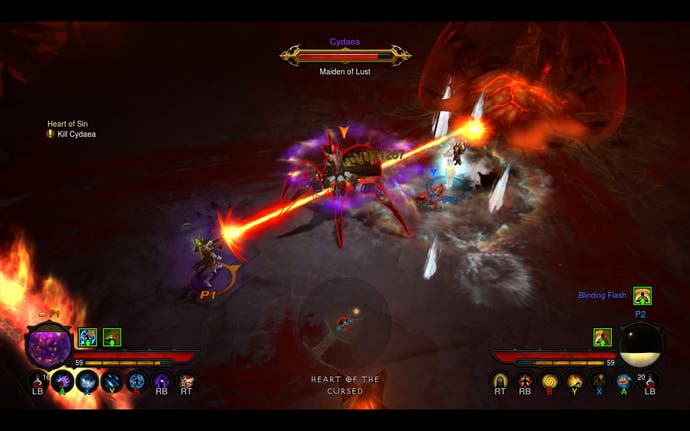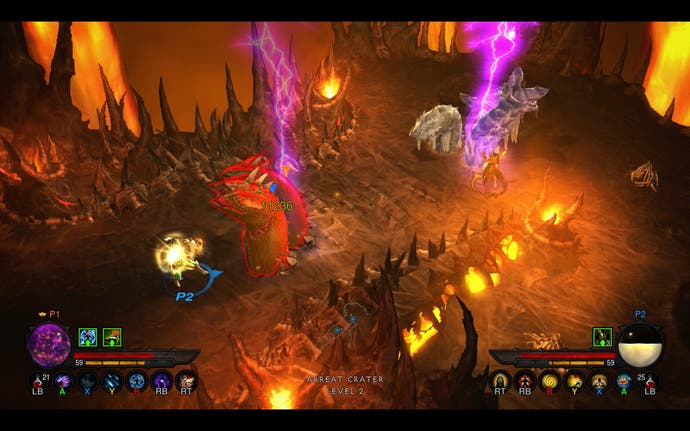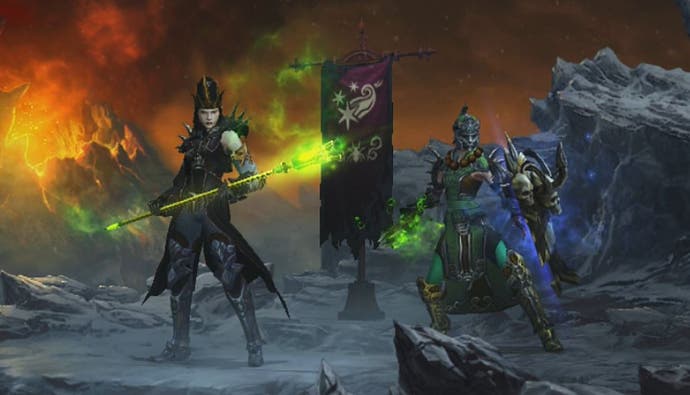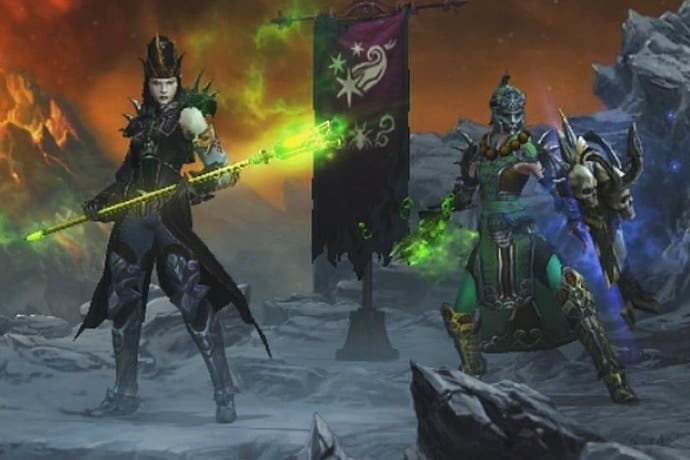Games of 2013: Diablo 3 console
Port authority.
Diablo 3 was supposed to be my game of 2012, but it wasn't. As a recovering World of Warcraft player, I thought its accelerated, flamboyant grind would be just the lightweight substitute I was looking for. I'd been following its development for years and already knew how fun it was to play. I was convinced this would be a long-term affair.
I thoroughly enjoyed the game on release and reviewed it very well, despite its troubled launch. The always-online requirement didn't bother me. The auction house was easy to ignore. I wasn't troubled by the slow loot progression at the endgame... because I never got there.
After four years of anticipation, I fell out of love with Diablo 3 in four weeks. I still liked and respected it, I just didn't want to be with it any more. The obvious culprit was the stingy and flavourless loot, but to be honest that didn't really occur to me at the time. Was the game too fast or too slow or too easy? Had it been balanced with too little care, or maybe too much - every system so well oiled and working so frictionlessly that you might as well not be playing it at all? Perhaps. I couldn't put my finger on it.
But the game wasn't done with me yet, and Blizzard wasn't done with the game. When the console edition was released this year, I fell for it the way I'd expected to fall for the original - hard, and for keeps.
The console version of Diablo 3 is the kind of bespoke custom job that few bother to make any more. Perhaps because Blizzard hadn't made a console game in-house for 16 years and three hardware generations, it looked at Diablo 3's new environment with fresh and inquisitive eyes. It wasn't just thinking about how to get its game running on console silicon and how to adapt the controls. It was thinking outwards, to the room you were in - how far you were from the screen, who else was there - and inwards, to how the changed circumstances reflected back on the game design.
The camera needed to be zoomed in. It felt better if you moved more. It was harder to deal with large groups of enemies without mouse control, so they put an evade in. Suddenly the positional tactics of Diablo 3's combat - a dimension the first two games barely possessed - were really picked out. This, Blizzard explained to us at BlizzCon, is why it can't and won't just patch controller support into the PC version: Diablo 3 on console looks the same and has the same content, but under the hood it's a deep custom tune, a quite different game that swings to a different beat. I tend to love games that have been tailored to fit their platform perfectly, and that's rarely as true of a port as it is here.
Feeling like the game was now theirs, Diablo 3's console team added more of their own little modifications to it. The Nephalem Glory buff, which drops randomly from monsters and stacks, gives the game new momentum, amping up the already ridiculous power of your heroes the longer you can keep a monster massacre going. It showed the game was now governed less by balance and more by feel. Then there was something as simple yet fundamental as the pause button bringing up a large-scale model of your character to rotate and admire: an animated action figure that further strengthens the tactile bond between player and game, already beefed up by the direct controls. (The PC team has been quick to nick both of these additions for March's Reaper of Souls expansion.)
It's as though Blizzard had to put Diablo in a different frame to remember what made it tick. The console game sings in your hands in a way the PC version just doesn't

There was also the sense of liberation that came from removing the connection requirement and turning off the auction house. Diablo is about trading items, Blizzard had insisted during the development of the PC version. But what happens if it isn't? Then it's about being showered in ridiculous hats and swords and legendary-quality trinkets with lists of affixes as long as your arm, until your character is so overpowered you need to reach into the game and turn up the power of the monsters - so they let you do that, too. And why not let you taste that feeling at level 15 instead of completing the 60-hour grind to the endgame first? In this new context, the designers couldn't think of a reason. They forgot about the economy and the network and remembered the player.
It's as though Blizzard had to put Diablo in a different frame to remember what made it tick. The console game sings in your hands in a way the PC version just doesn't. It has a musical ebb and flow.
The very best part, though, was that returning to consoles reminded Blizzard, one of the great pioneers of online gaming, about the joy of playing video games in the same room as your friends. They weren't the only ones who had forgotten.
My wife loves games as much as I do, and many of the same ones, but for some reason we never played together. We tried a bunch of times - Halo, Lego games, a brief and hostile rivalry on Words with Friends - but nothing stuck. We had a passion in common but couldn't find a way to fully share it. We'd spend weekends playing Ni no Kuni in separate rooms.

Diablo 3 on console changed that, and this is the real reason it's my game of the year. We only play it together, and we play it a lot. We've just hit level 60. It's given us dozens of hours of happy companionship: slaughtering buckets of demons, comparing hats, making tea while the other one shops and crafts.
Perhaps it was just the right game at the right time, although I think there's something truly beautiful in co-op Diablo 3. It's odd, because if you go looking for explicit co-op mechanics in the game, you'll barely find any. Most of the character classes and their skills are built to work equally well in single- and multiplayer. The action is so busy and fast that there's barely time to think, let alone collaborate or plan. The classes' roles are loose and hybridised, and tactics are much the same whether playing solo or together.
And yet those roles are of your own design, and those tactics are individual to you. Each hero is so deeply flexible and modifiable, and so resistant to any kind of cookie-cutter optimisation, that it can't help but take on a personal flavour. Bring these custom builds together, and you get something even better than a co-op mechanic prescribed by the game design: you get a relationship.
Mrs Oli's Monk is built for knife-edge aggression, balancing toughness and raw damage, sucking enemies onto her, forcing the pace. My Wizard is defined by control and economy, keeping the battle at bay with slowing and freezing effects and never running out of constantly replenishing magic power. She is a remorseless, angry terrier, dominating the centre. I am a cool hawk, managing the margins.
Playing games together - really together, side by side, not in separate bubbles connected by a stream of bits - can be uplifting, illuminating and liberating. We don't do it enough any more

That doesn't quite sound like us, but it is a part of us. This is the essence of role-play (yes, this most action-heavy of RPGs is very much a role-playing game after all): expressing an aspect of yourself that is real, but wouldn't find voice otherwise. I'm not about to claim that Diablo 3 has changed my marriage, but it has shown me a side of it that I wouldn't have seen as clearly otherwise - and all through its deliciously moreish medium of violence and numbers.
Playing games together - really together, side by side, not in separate bubbles connected by a stream of bits - can be uplifting, illuminating and liberating. We don't do it enough any more. We're even putting online play at one remove with asynchronous systems - kidding ourselves that chasing a ghost around a race track or answering moves like emails is the same thing as human contact. It's convenient, and it is fun, but there's a sense in which it's just technology getting in the way.
Diablo 3 on console tore through those invisible membranes and reminded me what video games can mean to a friendship, and vice versa - like the first Halo did, and Super Mario Kart before that, and the ZX Spectrum before that. That it's a far better and more lovable version of a game I so wanted to love, but only liked... well, that's just a bonus.


